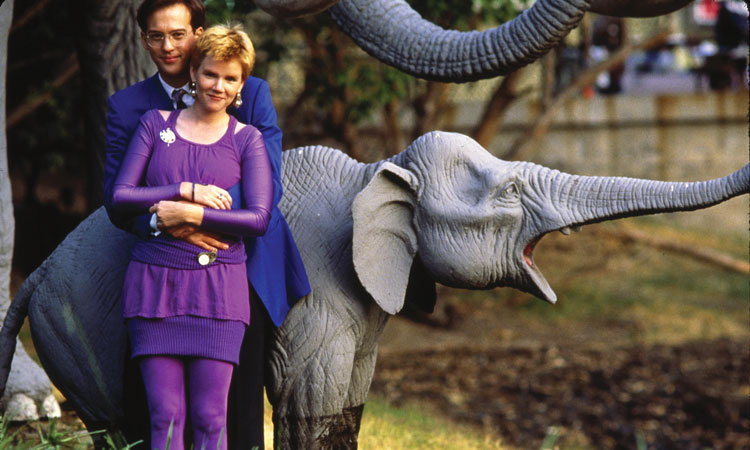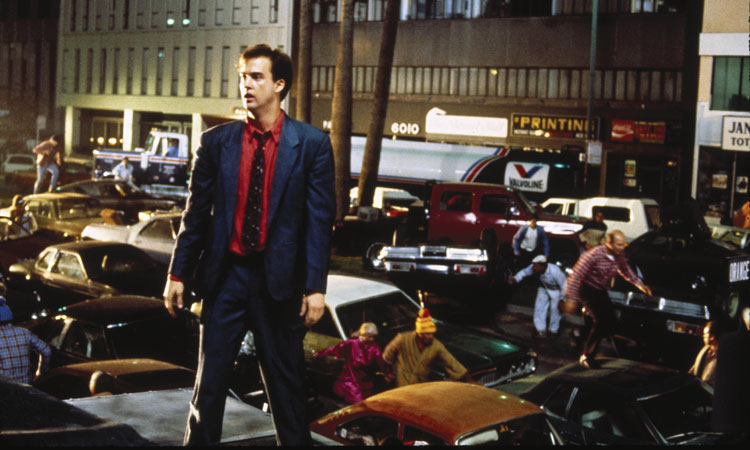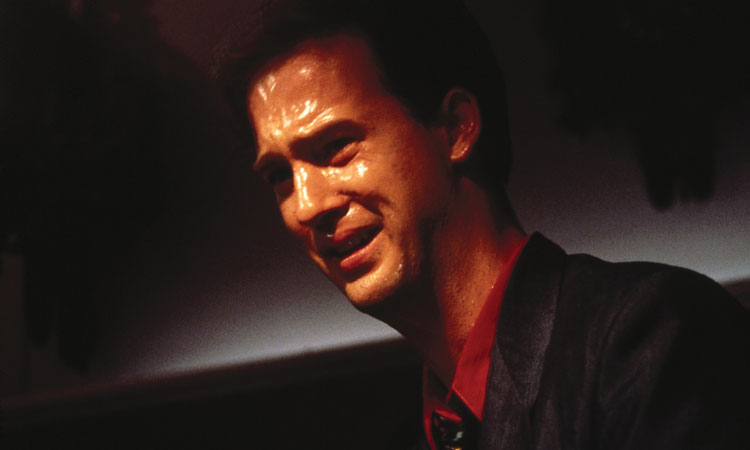If you asked a random sample of film fans to name an Eighties movie about the threat of nuclear Armageddon, chances are Steve De Jarnatt’s 1988 film Miracle Mile won’t be the one named. John Badham’s suspense thriller WarGames, Mick Jackson’s horrifically realistic BBC docu-drama Threads and Harry T Murakami’s animated drama When The Wind Blows are the more likely candidates in that respect. That’s in no way indicative of the quality of De Jarnatt’s film, however, because Miracle Mile is a classic. It just happens to have existed in a liminal space as a ‘cult’ or ‘overlooked’ classic, but that’s beginning to change.
While the film has always been championed by hardcore admirers, it’s the recent extras-laden, remastered Blu-ray releases that have given the film a well-deserved new lease of life. Contemporary critical reappraisals have elevated Miracle Mile’s standing and a new generation are being exposed to a tale that, by design, defies easy categorisation. The film’s stripped-back premise is that jazz trombonist Harry Washello (Anthony Edwards) answers a random wrong number call to a phone booth outside a diner in LA in the early hours of the morning and mistakenly hears that a full-blown nuclear attack is just over an hour away. It’s a simple idea superbly executed; visually symbolic, somehow both romantic and terrifying and as frighteningly relevant now as it was then.
Set in the days before cell-phones, rolling 24-hour media and the internet became commonplace, Harry and the diner’s patrons don’t know if the threat is real. Deciding to take no chances and get the hell out of dodge, the diverse protagonists are plunged into a nerve-wracked, will-it won’t-it happen and will-they won’t-they make it scenario that plays out in real-time. One of the film’s many plus points is that the audience flies as blind as the characters throughout, right up until the climax.
Love-struck Harry is the viewers’ eyes and ears as he frantically and single-mindedly attempts to locate Julie (Mare Winningham), the diner waitress with whom he had fallen in love-at-first sight with earlier that day. Will the new lovebirds be reunited and get to live a full and fruitful life together? Or will the bomb drop and turn their dreams into radioactive dust? These questions may be answered, but the fates of the various, richly drawn supporting characters that Harry encounters are left tantalisingly unresolved in a screenplay that is rewardingly difficult to second-guess and pin down.
Miracle Mile is also, presciently and inadvertently, a comment on how information spreads in our contemporary social media age, with initial Chinese Whispers exploding into a wildfire that spreads panic onto the streets rather than across the net. Though Miracle Mile’s narrative trajectory relies on the lack of easily accessible information, parallels can be drawn with how easily fact and fiction can be blurred online and how difficult it can be to differentiate between actual and ‘fake’ news.

If you haven’t seen Miracle Mile, then now is the time to stop reading, because it’s going to get spoilery from here on in…
When we talked to De Jarnatt, we began by discussing the film’s numerous genre and tonal shifts – effortlessly flitting as it does between romantic drama, disaster movie, black comedy and action flick – about which he commented: ‘It always kind of baffles me that it gets included in sci-fi lists – there isn’t anything beyond the realm of science in it other than the end of the world. It starts off like a light, fluffy Eighties rom-com. It was intentional to start that movie and then pull the rug out from under it.”
Born in 1951, De Jarnatt grew up in an America gripped by Cold War anxieties, which sowed the seeds from which Miracle Mile’s narrative would eventually grow. Partly written as a warning and to exorcise the ghosts of his childhood fears, De Jarnatt also reveals some telling contributing factors to the film’s multi-faceted screenplay. Citing the American novelist and short story writer Cornell Woolrich as an influence – whose various tales formed the basis for Hitchcock’s Rear Window, Truffaut’s The Bride Wore Black and Fassbinder’s Martha among many others – and a fondness for ‘any time-locked suspense or fate thing’ in general, it’s perhaps unsurprising that De Jarnatt’s screenplay for Miracle Mile is first and foremost a suspense-mystery with a Hitchcockian protagonist at its centre.
Described by his creator as “an average guy who gets Chicken Little information”, Harry’s eventual inability to secure safety for Julie and himself gives the character and the story a doomed, noirish quality. With a pragmatic shrug, the director explains that “you don’t save the day because you’re a trombone player, and not Bruce Willis in Die Hard.” Being the wrong man in the wrong place at the wrong time is a part of why Harry is such an empathetic character – he is the viewer inadvertently dropped into the middle of a waking nightmare.
Miracle Mile was shot on location at night over seven weeks in the Los Angeles neighbourhood from which the film gets its title, with many of the area’s architectural landmarks being prominently featured. De Jarnatt wrote the script with the locations in mind and was amazed that each one was secured for filming, something he is sure wouldn’t be the case today. Washington Boulevard was closed to the public for two nights during shooting of one of the film’s climactic sequences and, aside from a couple of instances of artistic licence being employed out of necessity, the geography of the Mile onscreen is pretty much as it is in actuality. The director recounts how he wrote the script at nights while blasting out Tangerine Dream’s score for William Friedkin’s Sorcerer. That eventually led to a rough cut of Miracle Mile featuring Tangerine Dream’s music that was presented to the band in what would be a successful effort to secure their services to provide an original score for De Jarnatt’s film.

Even though the writer/director finished the script back in 1979, it would take close to a decade before it eventually got made. The reason for such a drawn-out journey from page to screen? That ending. Yep, the bomb does drop at the end of Miracle Mile, and Harry and Julie sink into the La Brea Tar Pits where they initially met to become fossilised remains as the world above ground is reduced to ashes. On the struggle to retain artistic integrity and keep the film’s romantic but horrific conclusion, De Jarnatt is candid: “I could have made it earlier in the Eighties if I had changed the ending but you wouldn’t be talking to me today if they had got away or if it didn’t happen.”
Having optioned De Jarnatt’s script – voted in 1983 as one of the ten best unmade scripts in Hollywood by American Film magazine – Warner Brothers dragged their feet and considered hiring other writers to alter the screenplay. Eventually buying the rights back with $25,000 of his own money and redrafting aspects of the screenplay – turning Harry from an ageing alcoholic into Edwards’ fresh-faced musician being chief among them – De Jarnatt would later discover Warners had earmarked the tale for The Twilight Zone movie. Turning down the studio’s $500,000 offer to re-buy the rights to the screenplay was a wise decision on the director’s part. Warners had planned to change the ending so that Harry’s adventures were all a recurring dream, something that wouldn’t have satisfied either fans of The Twilight Zone or admirers of Miracle Mile’s original screenplay in the director’s opinion.
After a deal for TriStar to distribute the completed film fell through, the production company behind Miracle Mile, Hemdale Film Corporation (now Hemdale Communications) took on the distribution role themselves. Backed by TV ads, Miracle Mile received a limited release in L.A. and New York in May 1989, and held its own for a couple of weeks before, as De Jarnatt wryly admits: ‘The third Raiders movie and Field Of Dreams came out and blew everything else away.” Though generally well-received at the time, the film’s polarising effect on viewers is perhaps best exemplified by the opposing thoughts of the late Roger Ebert and Gene Siskel. While Ebert thought the film effective and possessed of a tangible sense of terror, Siskel myopically dismissed it by claiming that “the reality of a situation like this would be a lot rougher”.

With the political climate once again bringing the threat of nuclear war to the fore, there’s talk of a reboot/remake of Miracle Mile. Though the over-arching tale of boy meets girl is timeless and the destruction of civilisation as witnessed in the film is still sadly plausible, Miracle Mile’s setting in a pre-hyper-connected world throws up challenges to any updated take on the original screenplay.
On the idea of a new Miracle Mile, De Jarnatt is clear: “I don’t want to do it myself and I don’t necessarily want it to get made, but if I can’t control it I would at least like some control over it.” As for the time period a remake would take place in, De Jarnatt points out the obvious flaws of any contemporary update by stating that “I don’t want cell phones involved. It’s got to be something where you can’t find out, because then it’s a different movie”.
As for the current political, cultural and social climate, De Jarnatt is concerned that “we are now so distracted and detached from the consequences of anything, we seem to be able to absorb disaster and horrible things”. He is also convinced of some dark times ahead: “Something’s going to happen that will make people wake up. This is the lull, there will be some shock event or multiple shock events. We’ll look back on these times when we were on edge and say ‘Can’t we just go back to that time?’” Quoting a line from the film, De Jarnatt neatly sums up how many people may well feel about the future of our planet: “I think it’s the insects’ turn.”
Miracle Mile is available on Blu-ray from Arrow Video.
